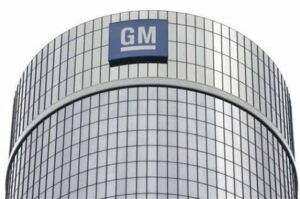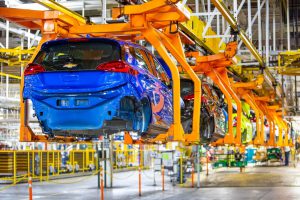
General Motors is suspending its dividend and stock buyback programs as it looks to keep its balance sheet in order as the pandemic continues.
Even as it prepares to restart its U.S. assembly lines, General Motors is taking a series of urgent steps to reduce the impact of the coronavirus pandemic on its balance sheet, among other things halting its dividend while also suspending its stock buyback program.
It begins the week by also moving back the repayment deadline for part of its revolving credit line, “to further strengthen its liquidity position,” the automaker said in a Monday morning statement. GM follows moves by rivals including Ford Motor Co., which last month suspended its own dividend and lined up new loans to shore up its balance sheet.
“We continue to enhance our liquidity to help navigate the uncertainties in the global market created by this pandemic,” said GM Chief Financial Officer Dhivya Suryadevara. “Fortifying our cash position and strengthening our balance sheet will position the company to create value for all our stakeholders through this cycle.”
(GM moving forward with preparations to restart plants.)
Like its competitors, large and small, GM has been hammered by the global outbreak of COVID-19. In recent months, it has been forced to shutter production operations in China, North America and other key regions. Global sales have tumbled to levels not seen since the Great Recession a decade ago.

General Motors Chairman and CEO Mary Barra continues to make moves to bolster the company’s efforts to get through the coronavirus outbreak.
While its factories have largely reopened in China, sales are still lagging well behind pre-pandemic levels. In North America, where production was brought to a halt in mid-March, GM is just getting ready to begin a slow ramp-up of operations in the U.S., starting next week. It remains unclear when plants in Canada and Mexico will come back online.
On the plus side, U.S. sales have remained stronger than expected going into April, according to J.D. Power. The consulting firm originally expected demand for the month would fall as much as 80% but, using data collected from thousands of dealers across the country, sales through April 19 appear to have dipped just 45%. Meanwhile, Detroit automakers actually saw their collective market share rise to around 50% during the past six weeks, a level not seen in a decade.
That largely reflects demand for full-size pickups, one of the few bright spots in the pandemic-weakened market. But to shore up sales, GM – and rivals Ford and Fiat Chrysler – have been offering record incentives reaching an average of around $7,200 for pickups and more than $4,000 for other vehicles, Power reported.
(GM cutting executive pay, deferring salaried compensation.)
Since automakers only make money delivering newly assembled vehicles, the plant closures have resulted in a virtual halt to revenues, leaving manufacturers struggling to reduce spending and line-up funds in a way not seen since the last recession.
That includes cutting its 38-cents-per-share quarterly dividend, which was equivalent to a 6.9% yield based on its current stock price. Along with suspending its stock buyback, GM noted in its statement that it will extend “$3.6 billion under its three-year revolving credit agreement to April 2022, to further strengthen its liquidity position. This complements the extension of the $2 billion 364-day revolving credit agreement to April 2021 that GM and GM Financial renewed earlier this month.
Ford beat GM to the punch by suspending its own dividend last month. The second-largest of the Detroit automakers also told lenders in March that it would access two lines of credit for $15 billion in loans. On April 17, Ford also issued $8 billion in new bonds.
Ford’s finances have been hammered during the last year, the automaker reporting 2019 net income of just $47 million, down from $3.7 billion the year before.
(GM taps credit lines to guard against virus impact.)
Ford reports its first-quarter 2020 earnings tomorrow, GM following up on Wednesday.


Perhaps they can fire their overpaid and lazy union workers. They need to get workers that really want to work.
Vito, going to call you out on this one. Comments like this are purely political and unjustified. To contend that UAW workers are lazy and unwilling to work is nonsense.
Paul E.
Kudos, Paul E.